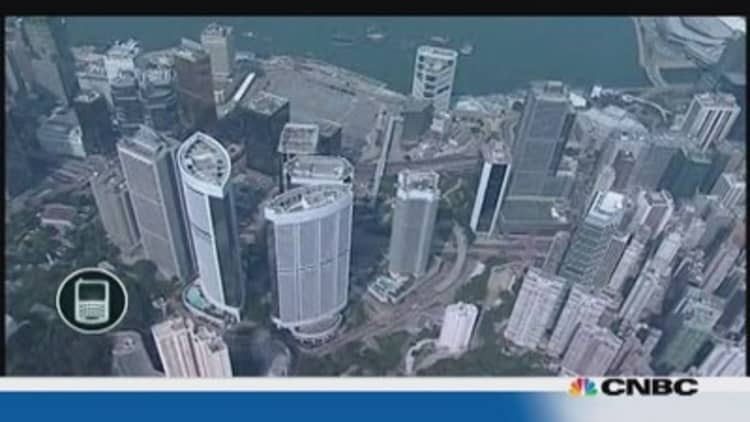Rising property prices in Australia, deemed one of the most expensive property markets in the world, have reignited worries over a bubble, but local residents and strategists remain unconvinced.
Prices in Australia have more than tripled since 1997, as low interest rates, high incomes and growing Asian demand worked to propel prices higher. There was a brief period of respite between 2011 and mid-2013 when prices fell 4 percent, but in recent times they have picked up again, rising at their fastest pace in three years in 2013 at near 10 percent.
This week Sydney and Melbourne were branded the fourth and fifth most unaffordable cities to buy a house out of 360 metropolises profiled in the Demographia International Housing Affordability survey published.
(Read More: Hong Kong's housing market is 'least affordable': survey)
A two bedroom apartment in central Sydney, for example, can fetch AUS$1.25 million ($1.1 million) according to property website Domain.
Rebecca Lipscomb, a 32-year old nurse from Sydney, told CNBC many of her peers are being forced to rent because house prices in the more desirable suburbs of Sydney are beyond what they can afford.
"One or two generations ago the Aussie dream was to have a house, but that's changed now. People have to move to smaller apartments, or away from central Sydney, or even overseas," she said.
"You just don't get a lot for your money. Young people have to turn to their parents for help. Unless you are in a couple, and are both on good salaries, then it is very hard to buy."
(Read more: Where's the next property bubble building?)
According to Nick Maroutsos, founder and managing director at Kapstream Capital, the pace at which Sydney house prices have spiked has been unsettling. As of January 24, house prices in Sydney rose 13.08 percent over the past 12 months, according to the RP Data-Rismark house price report, while Melbourne saw a 10.82 percent rise and Perth, a 7.63 percent jump.
"Is it a bubble? Possibly, which is another reason why the Reserve Bank of Australia will be reluctant to cut interest rates," he said. "First time homeowners are being priced out of the market and prices continue to head north. It is quite unsettling in that after a brief plateau the appreciation continued, but demand is high and supply is low."

But talk of a bubble in Australia's frothy property market has been around since 2001, and some analysts believe these concerns are cyclical and usually prove unfounded.
This week Fitch Ratings said it expects Australia's house prices to moderate over the next decade, helping cool some of the recent bubble talk. It said affordability will deteriorate in the near term, as house prices continue to rise more than income levels, but longer term it was not feasible for house price growth to excessively disconnect from incomes.
(Read More: Housing marketcould be facing another bubble: Shiller)
Evan Lucas, strategist at trading firm IG, said many commentators from Europe and the U.S. who have warned a bubble in Australia's housing are simply misinformed.
"If you look at the set-up of the country, 87 percent of the population live in major cities, so there will always be demand and not enough supply. It's different from other economies for that reason, and a lot of international commentators don't factor that in. That's why we have had a lot of calls for a bubble which haven't materialized," he added.
Another concern is that if interest rates rise from their current record low, borrowers could get squeezed and first time buyers could find it even more difficult to get on the property ladder, given that unemployment is expected to rise and many buyers are on low to medium incomes. There has also been some concern over negative gearing, when investors borrow to buy an asset, but the income generated doesn't cover the interest on the loan.
(Read more: 2014 a 'litmus test' for Australia economy: Goldman)
But Matthew Circosta, economist at Moody's Analytics, said he didn't perceive this to be a problem.
"Even if rates do rise, homeowners aren't going to feel much of a pinch as most are locked into fixed rate mortgages. It's not going to sap new demand. Prices might see a cooling, but they are not going to fall into a hole," he added.
Sam Aftasi, a 33-year-old account service manager, who owns two properties in Melbourne, told CNBC he also had a fixed rate mortgages so was not concerned about rising rates, and also thought bubble fears were overblown.
"I've read a lot about China and how they have all these investors speculating in the market, you don't have that situation here because people actually live in their homes and own them. We also have a large migration into Australia, so there is actually a shortage of homes, so when people say there is a bubble, there actually can't be a bubble because we don't have enough homes," he added.
(Read more: Why the Aussie dollar may spiral to 85 cents)
— By CNBC's Katie Holliday: Follow her on Twitter @hollidaykatie


